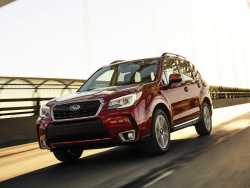
— A Subaru Forester airbag lawsuit alleges sensor problems cause the passenger frontal airbags to deactivate even when adults are in the passenger seats.
The class action lawsuit includes all consumers who purchased or leased 2014-2018 Subaru Forester SUVs.
According to the lawsuit, Subaru started using electrostatic capacitance sensors in the SUVs to activate and deactivate the passenger airbags in place of the standard weight sensors.
The capacitance sensors work by sending an electrical charge through the seat to determine the weight of the passenger. The system is meant to determine the size of the person occupying the passenger seat and turn the airbag on or off based on if the occupant is an adult or a child.
The sensor should detect if a child is in the passenger seat and therefore deactivate the airbag because it could injure the child if the airbag deploys. But an adult should always be protected by the airbag, something the plaintiff claims doesn't happen with the defective sensors.
According to the airbag lawsuit, replacement parts are often backordered and cause customers to wait months to have working airbags. Forester drivers also report paying close to $1,000 to repair the systems, including replacing the bottoms of the passenger seats.
The airbag lawsuit says Subaru contacted its dealerships in 2012 about how an airbag system could malfunction due to “a false electrical charge, for example, those caused by laptops that are processing data [or] cellphones that are on.”
Additionally, dealers were told that moisture could cause the systems to malfunction, including moisture from cleaning the seats and even getting into the vehicles after being in the rain.
Subaru followed up the message in 2013 and told dealerships the use of phone chargers or other power devices in the center power plugs could cause interference with the airbag systems.
In December 2017, Subaru issued bulletins to dealers about diagnosing airbag system problems in 2014-2018 Foresters, telling dealer technicians about a “revised troubleshooting procedure” to diagnose airbag sensor problems and avoid “unnecessary” repairs.
Subaru allegedly said a “temporarily” wet seat cushion could cause the airbag sensor to malfunction.
"The bulletin advises technicians to attempt to dry the seat cushion in an effort to avoid replacing it and to check all system connections." - Subaru airbag sensor lawsuit
Subaru has allegedly placed consumers in danger by violating warranty and consumer protection laws.
The Subaru Forester airbag lawsuit was filed in the U.S. District Court for the Central District of California - Johnson, et al., v. Subaru of America, Inc., et al.
The plaintiff is represented by Gibbs Law Group, DiCello Levitt Gutzler, and Beasley, Allen, Crow, Methvin, Portis & Miles.




